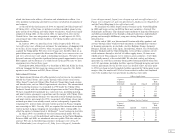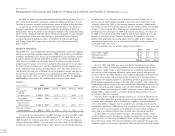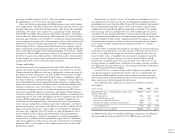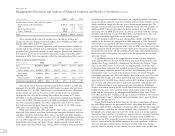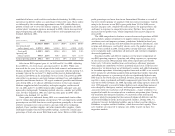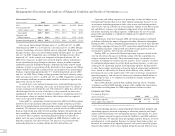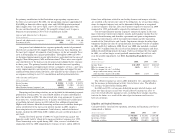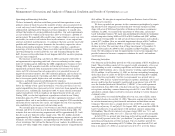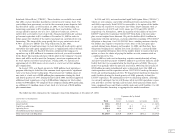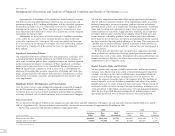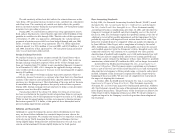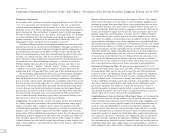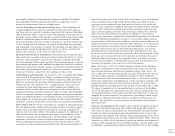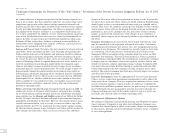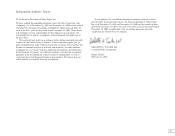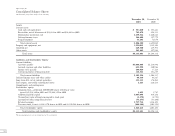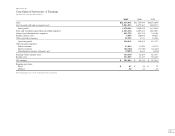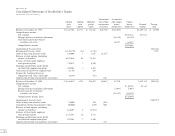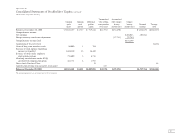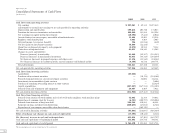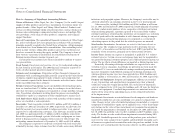Office Depot 2001 Annual Report Download - page 31
Download and view the complete annual report
Please find page 31 of the 2001 Office Depot annual report below. You can navigate through the pages in the report by either clicking on the pages listed below, or by using the keyword search tool below to find specific information within the annual report.
29
The risk sensitivity of fixed rate debt reflects the estimated increase in fair
value from a 50 basis point decrease in interest rates, calculated on a discounted
cash flow basis. The sensitivity of variable rate debt reflects the possible
increase in interest expense during the next period from a 50 basis point change
in interest rates prevailing at year end.
During 2001, we entered into an interest rate swap agreement to receive
fixed and pay floating rates, converting the equivalent of $250 million of this
portfolio to variable rate debt through 2008. The fair value of this agreement
at December 29, 2001 was immaterial. Additionally, the variable interest
payments of certain overseas debt have been hedged through mid-year 2002
under a variable to fixed rate swap agreement. The U.S. dollar equivalent
notional amount was $18.6 million at year end 2001 and $21.0 million at year
end 2000. Sensitivity of this agreement to a 50 basis point change in interest
rates was not material in either period.
Foreign Exchange Rate Risk
We conduct business in various countries outside the United States where
the functional currency of the country is not the U.S. dollar. This results in
foreign exchange translation exposure when results of these foreign opera-
tions are translated into U.S. dollars in our consolidated financial statements.
As of December 29, 2001, a 10% change in the applicable foreign exchange
rates would result in an increase or decrease in our operating profit of approx-
imately $11 million.
We are also subject to foreign exchange transaction exposure when our
subsidiaries transact business in a currency other than their own functional
currency. This exposure arises primarily from a limited amount of inventory
purchases in a foreign currency. The introduction of the euro and our decision
to consolidate our European purchases has greatly reduced these exposures.
During 2001, foreign exchange forward contracts to hedge certain inventory
exposures were less than $16.4 million.
One practical effect of the strong U.S. dollar over the past several years
has been a reduction in the reported results of operations from our extensive
overseas operations, due to the requirement to report our results in U.S. dollars.
While we look for opportunities to reduce our exposure to foreign currency
fluctuation against the U.S. dollar, at this point we have determined not to
pursue hedging opportunities generally.
Inflation and Seasonality
Although we cannot determine the precise effects of inflation on our busi-
ness, we do not believe inflation has a material impact on our sales or the
results of our operations. We consider our business to be somewhat seasonal,
with sales in our North American Retail Division and Business Services
Group slightly higher during the first and fourth quarters of each year, and
sales in our International Division slightly higher in the third quarter.
New Accounting Standards
In July 2001, the Financial Accounting Standards Board (“FASB”) issued
Statement No. 141, Accounting for Business Combinations, and Statement
No. 142, Goodwill and Other Intangible Assets. These Statements modify
accounting for business combinations after June 30, 2001 and will affect the
Company’s treatment of goodwill and other intangible assets at the start of
fiscal year 2002. The Statements require that goodwill existing at the date of
adoption be reviewed for possible impairment and that impairment tests be
periodically repeated, with impaired assets written down to fair value. The
initial test of goodwill must be completed within six months of adoption, or
by June 2002 for Office Depot, with a completion of testing by the end of
2002. Additionally, existing goodwill and intangible assets must be assessed
and classified consistent with the Statements’ criteria. Intangible assets with
estimated useful lives will continue to be amortized over those periods.
Amortization of goodwill and intangible assets with indeterminate lives will
cease. We have not yet completed the initial test of existing goodwill and,
accordingly, cannot estimate the full impact of these rules. However, goodwill
amortization, which totaled $7.0 million for 2001, will no longer be recorded.
In July 2001, the FASB issued Statement No. 143, Accounting for Asset
Retirement Obligations. This Statement requires capitalizing any retirement
costs as part of the total cost of the related long-lived asset and subsequently
allocating the total expense to future periods using a systematic and rational
method. Adoption of this Statement is required for Office Depot with the
beginning of fiscal year 2003. We have not yet completed our evaluation of
the impact of adopting this Statement.
In October 2001, the FASB issued Statement No. 144, Accounting for the
Impairment or Disposal of Long-Lived Assets. This Statement supersedes
Statement No. 121 but retains many of its fundamental provisions. Addition-
ally, this Statement expands the scope of discontinued operations to include
more disposal transactions. The provisions of this Statement are effective for
Office Depot with the beginning of fiscal year 2002. We do not anticipate a
significant impact to the Company’s results of operations from adoption of
this Statement.


